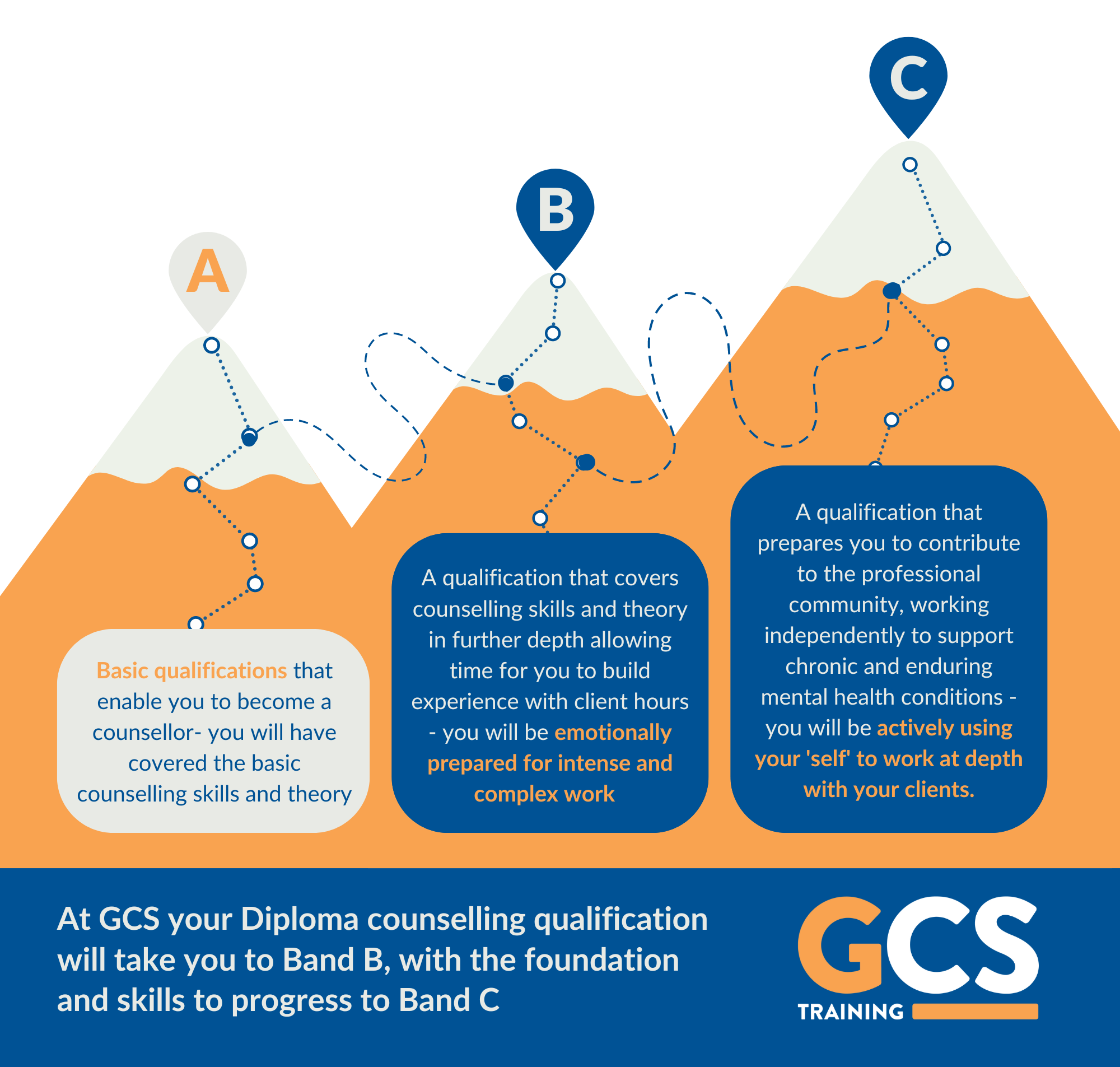Becoming a counsellor is a transformative journey. It offers the chance to profoundly impact individuals’ lives. As a counsellor, you create a safe space for clients to feel heard and valued. By choosing this path, you commit to lifelong learning and making a significant difference in the world. one conversation at a time.
Three Steps to Becoming a Counsellor with GCS
Step 1
The CCS is the perfect affordable, flexible, and experiential foundational training course to dip your toe in the water and see if counselling is for you. On completion of the course you will gain hugely valuable and transferable communication and listening skills and an understanding of human behaviour patterns. You will develop key insight into your own behaviour and relationships and understand the vital role you could play as a psychodynamic counsellor.
Step 2 : Band B
If you decide after the CCS that counselling is for you, the next step is to enter onto our highlyregarded diploma course. This course not only provides you with the theoretical elements needed to become a counsellor, GCS also provides the clinical work based opportunities to accumulate the clinical hours needed without leaving you to find your own clients and supervision. GCS will be with you every step of the way, training advising, supervising and pairing you with clients you are best placed to support.
Step 3 : Band B / Band C
The supervised counselling placement offered in the programme provides an opportunity for qualified counsellors to achieve the client hours required for individual accreditation by BACP or BPC. This course supports counsellors to develop the skills and competencies that enable accreditation status.
How to become a counsellor?
It can take around 3 to 4 years to train to become a counsellor. The training can be split into three stages. The British Association for Counselling and Psychotherapy (BACP) recommends the following route, which our courses map.
Stage 1: Introduction to counselling
Take an introductory course to find out if counselling as a career is the right choice for you. GCS offers this course as an intensive two day course. In two days you’ll get an overview of the counselling process as well as training in core listening and counselling skills. The GCS Introduction to Counselling & Listening Skills course (ITC) has been running for many years and receives consistently excellent feedback. To find out more and check availability visit the ‘Introduction to Counselling & Listening Skills’ page.
Stage 2: Certificate in Counselling Skills
To move into a counselling career you’ll need to develop your counselling skills and gain a deeper understanding of counselling theories, ethics and self-awareness. The course is offered as a full year starting in September (working alongside the academic school year) consisting of 3.5 hour, weekly sessions at our training centres in Stroud, Cheltenham or Gloucester. Weekly sessions happen both in the evening and day time and most attendees are in part or full-time work while undertaking this course. Alternatively, an intensive option is available from January consisting of a mixture of long and short weekends.
Stage 3: Core practitioner training
BACP say, “This will give you the skills, knowledge and competence to work as a counsellor or psychotherapist. Your core practitioner training should be at the minimum level of a diploma in counselling or psychotherapy, but could be a bachelor’s degree, master’s degree or doctorate.”
At GCS we offer the ‘Diploma in Psychodynamic Counselling’ The training runs over three years and combines theoretical understanding with clinical practice. All trainees are provided with a clinical placement within GCS’s Clinical Service. Clinical supervision of this work is an integral part of the course and is provided for trainees on site in Stroud. The Diploma training is accredited by BPC (British Psychoanalytic Council). This course is aimed at individuals who want to gain a professional qualification in counselling and ultimately, with post qualification training and experience, be able to gain professional accreditation as a counsellor.
Can I work independently?
The Post Qualification Course is intended for qualified counsellors and psychotherapists who wish to develop a range of skills and capacities that are important in moving towards independent practice or working in an organisation. Starting from September, this programme runs for one calendar year and comprises a supervised counselling placement with our adult open-ended counselling service alongside our programme of taught workshops.
The supervised counselling placement offered in the programme provides an opportunity for diploma-qualified counsellors to achieve the post qualification client hours required for individual accreditation by BACP.
Contact Us
If you want to find out more about your options training with GCS contact us now via email [email protected]
The route to becoming a counsellor can present a great many options and choices, some of which you may not be aware of at the outset. We offer all our trainees a free consultation to openly discuss their hopes, concerns and questions in a fully confidential environment.
Choosing the right training for you
The counselling qualification landscape can be difficult to navigate as courses cover different ways of training. Thinking about where a training gets you to can help you make the right decision for you.
